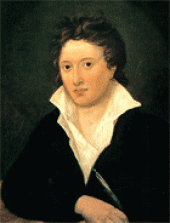Irony
the contrast between actual meaning and the suggestion of another meaning. Verbal irony is a figure of speech in which the actual intent is expressed in words which carry the opposite meaning. Irony is likely to be confused with sarcasm, but it differs from sarcasm in that it is usually lighter, less harsh in its wording though in effect probably more cutting because of its indirectness. The ability to recognize irony is one of the surer tests of intelligence and sophistication. Among the devices by which irony is achieved are hyperbole and understatement.
Bereavement
Percy Bysshe Shelley
How stern are the woes of the desolate mourner
As he bends in still grief o’er the hallowed bier,
As enanguished he turns from the laugh of the scorner,
And drops to perfection’s remembrance a tear;
When floods of despair down his pale cheeks are streaming,
When no blissful hope on his bosom is beaming,
Or, if lulled for a while, soon he starts from his dreaming,
And finds torn the soft ties to affection so dear.
Ah, when shall day dawn on the night of the grave,
Or summer succeed to the winter of death?
Rest awhle, hapless victim! and Heaven will save
The spirit that hath faded away with the breath.
Eternity points, in its amaranth bower
Where no clouds of fate o’er the sweet prospect lour,
Unspeakable pleasure, of goodness the dower,
When woe fades away like the mist of the heath.
In Percy Bysshe Shelley’s poem “Bereavement”, Shelley uses the literary device of irony to throw a twist at the reader. He begins his poem using negative connotation and negative images, but finishes it off with lighter words and images. He uses the words “Desolate mourner” and “unspeakable pleasure” to accentuate the change in the narrator’s thoughts, and underline the irony of the poem.

"A man, to be greatly good, must imagine intensely and comprehensively; he must put himself in the place of another and of many others; the pains and pleasures of his species must become his own." ~Percy Bysshe Shelley
Percy Bysshe Shelley

Percy Bysshe Shelley (1792-1827) was born August 4, 1792, at Field Place, near Horsham, Sussex, England. The eldest son of Timothy and Elizabeth Shelley, with one brother and four sisters, he stood in line to inherit not only his grandfather's considerable estate but also a seat in Parliament. He attended Eton College for six years beginning in 1804, and then went on to Oxford University. He began writing poetry while at Eton, but his first publication was a Gothic novel, Zastrozzi (1810), in which he voiced his own heretical and atheistic opinions through the villain Zastrozzi.
At age nineteen, Shelley eloped to Scotland with Harriet Westbrook, sixteen. Once married, Shelley moved to the Lake District of England to study and write. Two years later he published his first long serious work, Queen Mab: A Philosophical Poem. The poem emerged from Shelley's friendship with the British philosopher William Godwin, and it expressed Godwin's freethinking Socialist philosophy. Shelley also became enamored of Godwin and Mary Wollstonecraft's daughter, Mary, and in 1814 they eloped to Europe. After six weeks, out of money, they returned to England.
In November 1814 Harriet Shelley bore a son, and in February 1815 Mary Godwin gave birth prematurely to a child who died two weeks later. The following January, Mary bore another son, named William after her father. In May the couple went to Lake Geneva, where Shelley spent a great deal of time with George Gordon, Lord Byron, sailing on Lake Geneva and discussing poetry and other topics, including ghosts and spirits, into the night. During one of these ghostly "seances," Byron proposed that each person present should write a ghost story. Mary's contribution to the contest became the novel Frankenstein. That same year, Shelley produced the verse allegory Alastor, or The Spirit of Solitude. In December 1816 Harriet Shelley apparently committed suicide. Three weeks after her body was recovered from a lake in a London park, Shelley and Mary Godwin officially were married. Shelley lost custody of his two children by Harriet because of his adherence to the notion of free love. I
n 1817, Shelley produced Laon and Cythna, a long narrative poem that, because it contained references to incest as well as attacks on religion, was withdrawn after only a few copies were published. It was later edited and reissued as The Revolt of Islam (1818). At this time, he also wrote revolutionary political tracts signed "The Hermit of Marlow." Then, early in 1818, he and his new wife left England for the last time. During the remaining four years of his life, Shelley produced all his major works, including Prometheus Unbound (1820). Traveling and living in various Italian cities, the Shelleys were friendly with the British poet Leigh Hunt and his family as well as with Byron. On July 8, 1822, shortly before his thirtieth birthday, Shelley was drowned in a storm while attempting to sail from Leghorn to Le Spezia, Italy, in his schooner, the Don Juan.
(http://www.readprint.com/author-72/Percy-Bysshe-Shelley)
